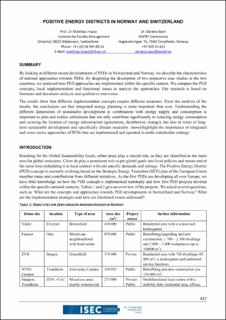Please use this identifier to cite or link to this item:
https://doi.org/10.21256/zhaw-27482Full metadata record
| DC Field | Value | Language |
|---|---|---|
| dc.contributor.author | Haase, Matthias | - |
| dc.contributor.author | Baer, Daniela | - |
| dc.date.accessioned | 2023-03-28T09:58:25Z | - |
| dc.date.available | 2023-03-28T09:58:25Z | - |
| dc.date.issued | 2022-04-04 | - |
| dc.identifier.uri | https://digitalcollection.zhaw.ch/handle/11475/27482 | - |
| dc.description.abstract | By looking at different recent developments of PEDs in Switzerland and Norway, we describe the characteristics of national approaches towards PEDs. By deepening the description of two respective case studies in the two countries, we analyzed how PED approaches are implemented within the specific context. We compare the PED concepts, local implementation and functional issues to analyze the approaches. Our research is based on literature and document analysis and qualitative interviews. The results show that different implementation concepts require different measures. From the analysis of the results, the conclusions are that integrated energy planning is more important than ever. Understanding the different dimensions of sustainable development in combination with energy supply and consumption is important to plan and realize settlements that not only contribute significantly to reducing energy consumption and securing the location of energy infrastructure (generation, distribution, storage), but also in terms of long-term sustainable development and specifically climate neutrality. shows/highlight the importance of integrated and cross-sector approaches of PEDs that are implemented and operated in multi-stakeholder settings. | de_CH |
| dc.language.iso | en | de_CH |
| dc.publisher | AEE INTEC | de_CH |
| dc.rights | Not specified | de_CH |
| dc.subject | Positive energy district | de_CH |
| dc.subject | Implementation | de_CH |
| dc.subject.ddc | 333.79: Energie | de_CH |
| dc.subject.ddc | 658.2: Facility Management | de_CH |
| dc.title | Positive energy districts in Norway and Switzerland | de_CH |
| dc.type | Konferenz: Paper | de_CH |
| dcterms.type | Text | de_CH |
| zhaw.departement | Life Sciences und Facility Management | de_CH |
| zhaw.organisationalunit | Institut für Facility Management (IFM) | de_CH |
| zhaw.publisher.place | Graz | de_CH |
| dc.identifier.doi | 10.32638/isec2022 | de_CH |
| dc.identifier.doi | 10.21256/zhaw-27482 | - |
| zhaw.conference.details | 2nd International Sustainable Energy Conference (ISEC), Graz, Austria, 5-7 April 2022 | de_CH |
| zhaw.funding.eu | No | de_CH |
| zhaw.originated.zhaw | Yes | de_CH |
| zhaw.pages.end | 619 | de_CH |
| zhaw.pages.start | 617 | de_CH |
| zhaw.publication.status | publishedVersion | de_CH |
| zhaw.publication.review | Peer review (Abstract) | de_CH |
| zhaw.title.proceedings | ISEC 2022 Conference Proceedings | de_CH |
| zhaw.funding.zhaw | Dekarbonisierung von Quartieren | de_CH |
| zhaw.author.additional | No | de_CH |
| zhaw.display.portrait | Yes | de_CH |
| Appears in collections: | Publikationen Life Sciences und Facility Management | |
Files in This Item:
| File | Description | Size | Format | |
|---|---|---|---|---|
| 2022_Haase-Baer_Positive-energy-districts-Norway-Switzerland_ISEC2022.pdf | 267.21 kB | Adobe PDF |  View/Open |
Show simple item record
Haase, M., & Baer, D. (2022). Positive energy districts in Norway and Switzerland [Conference paper]. ISEC 2022 Conference Proceedings, 617–619. https://doi.org/10.32638/isec2022
Haase, M. and Baer, D. (2022) ‘Positive energy districts in Norway and Switzerland’, in ISEC 2022 Conference Proceedings. Graz: AEE INTEC, pp. 617–619. Available at: https://doi.org/10.32638/isec2022.
M. Haase and D. Baer, “Positive energy districts in Norway and Switzerland,” in ISEC 2022 Conference Proceedings, Apr. 2022, pp. 617–619. doi: 10.32638/isec2022.
HAASE, Matthias und Daniela BAER, 2022. Positive energy districts in Norway and Switzerland. In: ISEC 2022 Conference Proceedings. Conference paper. Graz: AEE INTEC. 4 April 2022. S. 617–619
Haase, Matthias, and Daniela Baer. 2022. “Positive Energy Districts in Norway and Switzerland.” Conference paper. In ISEC 2022 Conference Proceedings, 617–19. Graz: AEE INTEC. https://doi.org/10.32638/isec2022.
Haase, Matthias, and Daniela Baer. “Positive Energy Districts in Norway and Switzerland.” ISEC 2022 Conference Proceedings, AEE INTEC, 2022, pp. 617–19, https://doi.org/10.32638/isec2022.
Items in DSpace are protected by copyright, with all rights reserved, unless otherwise indicated.